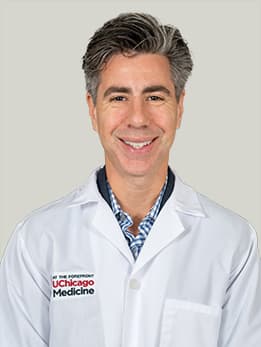$500,000 gift will support worldwide effort to harness pediatric cancer data to advance treatment for children

Ryan Scheppach always tried to find the bright side, even as a 7-year-old living with acute lymphoblastic leukemia (ALL), the most common form of pediatric cancer. His cancer experience and outlook motivated his parents, Tracey and Ray Scheppach of Northfield, Illinois, to create a charity — named Team Bright Side after Ryan’s positive attitude — to support cutting-edge pediatric cancer research.
Now a teen, Ryan and his family are motivated by his nearly four-year arduous treatment journey to find solutions that will lead to improved therapies for children with cancer. Their search led the family to the University of Chicago Medicine Comer Children’s Hospital and the Pediatric Cancer Data Commons (PCDC), to which they provided with a $500,000 donation.
The foundation’s gift will help build a data commons specifically for ALL, a cancer of the blood and bone marrow. In the United States, about 3,000 children will be diagnosed with ALL this year, according to the American Cancer Society.
Led by Sam Volchenboum, MD, PhD, MS, a pediatric oncologist at Comer Children’s and an associate professor of pediatrics at the University of Chicago, the PCDC is an international collaboration of leading pediatric cancer researchers who are pooling childhood cancer patients’ data together using uniform data standards and rules for data collection. This standardization allows cancer researchers worldwide to access a greater volume of data to drive discovery and advance treatment.
The PCDC offers a solution to one of the major impediments to childhood cancer research, which is the quantity and quality of pediatric clinical data that has been available to researchers.
“Pediatric oncology researchers are always faced with not having enough data to study,” said Volchenboum.
According to the American Cancer Society, about 11,000 children in the United States under the age of 15 will be diagnosed with cancer in 2020, which accounts for less than 1% of all cancers.
“The Pediatric Cancer Data Commons harnesses the power of aggregating data from multiple sources — empowering researchers to study childhood malignancies,” Volchenboum said.
Creating a data commons addresses problems with inefficient data practices, promotes universal standards and definitions for the data, and allows for the development of consensus guidelines for therapy and survivorship across the world.
Through a single combined, open platform, the PCDC is making data available to clinicians and researchers everywhere. By harnessing pediatric leukemia data from all over the world, researchers will be able to access the largest collection of data ever available for study.
“This fundamental work has not been done for children facing ALL yet,” Tracey Scheppach said. “Our family wanted to address the largest impediment to progress in pediatric ALL. A transformational breakthrough cannot be done without sufficient data to study.”
By bringing together imaging and clinical and genomic data, pediatric researchers will have the tools to look for patterns that reveal how cancers work and design ways to prevent and safely treat them.
“The data commons will help pave the way for more effective treatments that will make a difference for kids, like Ryan,” Tracey Scheppach said.
To learn more about the Pediatric Data Commons, visit Samuel L. Volchenboum, MD, PhD, MS, is an expert in pediatric cancers and blood disorders. He has a special interest in treating children with neuroblastoma, a tumor of the sympathetic nervous system.
Samuel Volchenboum, MD, PhD, MS
